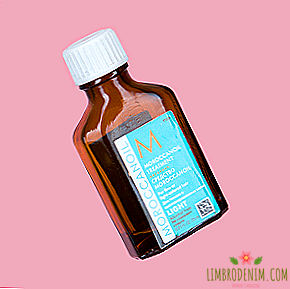Point of no return: My mom and her alcoholism
A drinking husband is a classic look: terrible, sad, but quite ordinary. The drinking woman is still perceived as nonsense. In my best times, my mother was beautiful. She was incredibly vital - and vulnerable. Very open to everything - sometimes this openness became painful, turned into attempts to force other people to open too, even if they didn’t want it.

She was actually my grandmother. My own mother went abroad, and my grandmother and grandfather raised me. We somehow miraculously passed over the problem of lack of money of the nineties, so that if we didn’t concentrate on family ties, my family could well be called safe. All the time that I remember myself, I called my grandmother mom. As a child, I adored her. Most of all I liked to sit in the kitchen with her, do my homework while she was preparing dinner and watched “Fashion sentence” or “Court is coming.” A dog was always spinning under her feet, and in the summer, my mother opened the balcony, and the warm wind went through the thin cream curtains. This picture for me is a symbol of all the best that was in childhood. Every hour I had to hug or kiss her, how to check if everything was alright, if she was with me, if something had changed in this universe. Every night before bed, I needed to talk to her for a while. I was always anxious for her, but I didn’t know why.
In my youth, my mother was hard. She waited from me the same closeness as before, but I wanted to go to the world, I wanted to change it, to look for people willing to do this with me. Like all teenagers, I was passionate about myself and my feelings and did not notice how my mother was getting worse. She stopped going to yoga, less communicated with her friends. It seems to me that I was for her something of a window into another reality, not connected with washing and cleaning. Mom was a housewife in our rather patriarchal (or rather just typical Soviet) family, where at twenty-one is the first child, and at forty-five are grandchildren, brawn and husband. The latter needs dinner and emotional support after work. Mom, who in her youth was riding a motorcycle, flew gliders and lost her eardrum, because she didn’t want to give up parachute jumping because of a cold.
"I would like to be a psychologist. I wish I could go to study!" - She dreamed in the bright moments. Or: "I want to draw pictures. I have not been to the theater for a hundred years." "This cooking, this house has been soaked to me. I am here as a maidservant for everyone," in difficult moments. I missed the moment when, instead of the usual detective stories and knitting magazines, books like How to Fight Depression and Five Steps to Balance began to appear in the house. Maybe I was just afraid to notice these signs as requests for help. Everything was approaching the point of no return, and when I was eighteen, my mother had a hard drinking.
Once she left drunk from the house, and she was raped. She lay in the hospital. Then she tried to encode - for the first time did not work. Went to some strange esoteric conversation. She was able to stop drinking only when I came home. This can hardly be called my merit, rather, I was just a child who was left alone, was looking for love and wanted someone to always be there. She wanted the same thing.
When I was eighteen, I was not ready for this, for another mom I knew nothing about. My family talked about her as something shameful, and it offended me and scared. Old grievances fell on me and a lot of hard words. In general, at some point I decided that I no longer could, took the dog, a few things and left to live in the country.
The booze lasted three months. Mom ran out of the house twice, once stole money. For days lay on the bed, turned to the wall. Nights crashed the apartment. My grandfather sent her to the drug treatment center, but it only got worse. He tried to “educate” her, took away her passport, forbade her to leave the house. It is important to say here that I do not consider my grandfather guilty in this story. He was a man of his time, a child of the thirties, a pilot at a military factory. He grew up in a society with very repressive ideas about how a man should “act” - decisively, without hesitation. It seems to me that my grandfather simply did not know what to do in this situation, and this ignorance put him out of himself. After all, he was used to being hard in the most extreme circumstances: a falling plane, a burning engine, an overload in 15G. These situations were different from what he had to face. There was no right decision. Mom killed herself.
It can be different
Experts identify several stages of alcohol dependence. Often, people exceed the norm, but do not have an alcohol dependence and are able to stop drinking on their own. Dependence is only beginning to form: a person gradually needs more and more to feel intoxicated, and he drinks more and more often. At the first stage of alcohol addiction, a person stops controlling the amount of alcohol consumed because he cannot stop. In the second stage of addiction, a person has a hangover syndrome: most people who have drunk too much, do not want to drink any more in the morning (like with any other poisoning, we don’t want to use something that is so bad for us), but a person with alcohol addiction on the contrary, it helps to feel better.
In the last twenty years in the world, the difference between the number of women and men suffering from alcohol addiction has been greatly reduced. In Russia, you can see similar processes: at the end of the eighties, the ratio of women to men with alcohol dependence was about 1:10, by the beginning of the two thousandth, it was already 1: 6. At the same time, the Russian situation can be connected not only with global trends, but also with economic crises. The data of the Russian Monitoring of the Economic Situation and Health of the Population (RLMS) of 2005 show that in Russia the volume of alcohol consumption directly depends on the quality of life in a given region.
In our country, there is still a stereotype about the special "female" alcohol addiction: it is believed that women are in a particular risk group, and their dependence is incurable.
Some scientists believe that from a physiological point of view, alcohol is really stronger and faster effect on women. Research data suggests that women, on average, weigh less than men and their body contains less water - therefore, when alcohol is consumed, women are influenced by a greater concentration of toxic substances. In addition, alcohol has a different effect on the hormones of men and women.
Gender researcher and sociologist from the HSE Olga Isupova looks at the problem of women's alcohol dependence a little differently. In her article “TO DRINK: the inevitable heroism and inescapable guilt of motherhood” she connects problems with alcohol in women with gender stereotypes in society, social pressure from the family and others. Our current "conservative turn", according to Yusupova, turns out not to be the universal happiness of the "ideal" families, but depressions, addiction to alcohol and even violence against children. This idea is also important because alcohol addiction is a social problem, and stereotypes about femininity and masculinity play an important role here.
Studies have shown that women with alcohol addiction are much less likely to stop drinking, says Nancy Cross of Women for Sobriety Inc., the first organization in the United States that helps women overcome alcohol dependence on a non-commercial basis. WfS has been working for more than forty years, and the organization is convinced that women need another recovery program that is different from men’s: if at the physiology level, recovery is approximately the same, then at the emotional level, women need other forms of support. There are no men among WfS employees, the work is based on women's mutual aid - in groups, in closed forums and on a helpline. This allows women with alcohol dependence to discuss topics that are relevant to them: for example, breast cancer, the risk of which can increase if a woman drinks, or rape experience - painful questions that sometimes can only be discussed with someone who has experienced something like that.
Support, even from completely strangers, is important for those who are trying to recover from alcohol dependence. This is especially true of women stigmatized and rejected by society. We are talking not only about meetings in groups, but also about online support - here you can find many stories of those who quit drinking or are just on the way to this. There are well-known people who make a kind of coming-out, talking about problems with alcohol. For some, the recognition translates into a whole project, like, for example, American journalist ABC News Elizabeth Vargas. In 2016, she released a book about her rehabilitation experience, “Between Breaths: A Memoir of Panic and Addiction”. This is a serious challenge to public opinion: it is believed that problems with alcohol are incompatible with the "true" femininity, and the "shameful" question of female alcohol dependence is hardly discussed.
Where to go?
In the first stage of the disease, a person can stop drinking or reduce the amount of alcohol consumed independently, following simple recommendations. For example, you can try to stretch the portions of alcohol and drink more slowly, monitor the amount of alcohol consumed and pay attention to the triggers - the situation and people who urge to drink more, even if you do not want.
With addiction at a later stage, things are more complicated. One of the most common solutions to a problem is to contact anonymous alcoholics group. On the Internet you can find a website with information on the work of such groups in different cities of Russia. In my hometown near Moscow, there are two AA groups, both of them, like many others, work on the basis of Orthodox churches. There is no separate women's group, although they exist in Moscow - one of them, for example, is called "Girls", its members also gather on the territory of an Orthodox church, in an outhouse.
The inclination to Orthodoxy is characteristic of many AA groups in Russia. Even the programs of those operating on the basis of state drug dispensaries can include reading prayers, communication with an Orthodox priest and other similar events. A striking example is the group with the biblical name "Rehavit", which meets in Moscow drug treatment center No. 9.
Another problem is that the effectiveness of anonymous alcoholics groups is not obvious. For example, a researcher at the University of Maryland Medical School, Bankoule Johnson, argues that a total rejection of alcohol is not the only possible way to cope.
This allows you to make the program "moderate drinking", that is, moderate alcohol consumption. The participant sets himself the norm, which should not exceed (approximate can be found, for example, here), and adheres to it. Some program participants keep diaries, where they record, when and how much they drink.
In situations where a person can not immediately and completely abandon the use of alcohol, experts can advise a different approach: minimize the harm from drinking alcohol, that is, to ensure that a person consumed alcohol less often and in smaller doses. Prescription drugs are used for this - opioid receptor blockers, thanks to which, even if a person drinks, he does not feel pleasure. In addition, psychotherapy often helps with alcohol addiction treatment: other problems are often masked by alcohol use.
To top
It is difficult to help a person who is not ready or unable to make an effort to recover. I understand those who, without regret, break relations with alcohol-dependent people, because there may be a lot of lies, fear, anger, emotional and physical violence in them. Alcohol addiction, like any other, affects the personality of a person, his habits.
Nevertheless, we can make a difference. The first step in solving a problem is to talk about it. The second is to abandon the stigmatization of people with alcohol dependence, and in particular women. The idea that only people with no education or low incomes face it is wrong: such problems can arise even in the most prosperous at first glance families - and the difference in harm from the use of cheap and expensive alcohol is only the body is influenced by the impurities of the drink.

Now neither mom nor grandfather anymore. I remember them with great gratitude and love, because they gave me a happy childhood. Five years after my mother's death — after years of talking with friends, psychologists, and treatment — I came to balance, and I have many plans for the future. Among other things, I want to change the attitude to the problem of female alcohol dependence. I often think that everything in my story could be different. Less repressive family model, less pressure and more opportunities. More freedom of choice. More ways to recover. I am sure that all this is necessary, including that there should be fewer such stories.





